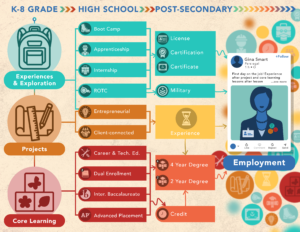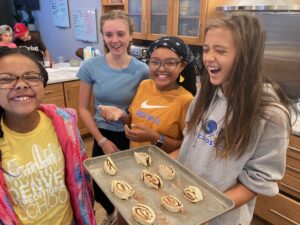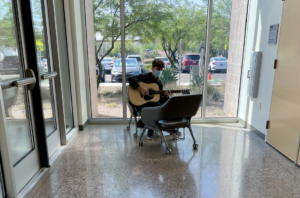Dialogue on a Content-Rich Elementary Experience

Chester E. Finn, Jr., is a Distinguished Senior Fellow and President Emeritus at the Thomas B. Fordham Institute. Checker, as many of us know him, recently wrote in EdNext about his support for personalized learning, defining it as “enabling every child to move through the prescribed curriculum at his or her own speed, progressing on the basis of individual mastery of important skills and knowledge rather than in lockstep according to age, grade level and end-of-year assessments.”
I responded with a taxonomy of views on personalized learning ranging from content-centric to student-centered. It resulted in a spirited email dialogue (edited below for brevity and clarity) about the role of content in developing language proficiency.
Mike Petrilli (MP), President of the Fordham Institute, suggested that there were important differences between elementary and secondary. “Wouldn’t we all agree that it makes sense to give students more choices as they get older? Especially if they all have a strong, and common, foundation in, say, grades K through five?”
I (TVA) responded: We certainly agree with a continuum of voice and choice and (like schools) earned autonomy over location and path from K to 12.
The elementary schools we’re most fond of manage a mash up of personalized standards-based reading and math with project-based approach yielding high skill/high agency:
- In Washington, D.C., we like Horace Mann Elementary
- In San Diego, we like Thrive Public Schools
- In San Jose, we like Katherine Smith (the New Tech Network anchor elementary school)
Robert Pondiscio (RP), Senior Fellow at Fordham, responded: It’s a tough thing to get right, striking the balance between personalized learning, the engagement it promises and our responsibility to the students we serve. Shared knowledge is not an article of faith, but a foundational element of language proficiency. At some point, you can no more say “decide what you want to learn” than you can say “decide which of the 26 letters of the alphabet you want to learn.”
TVA: The article simply attempted to point out that folks at Education Reimagined, P21, New Tech Network, High Tech High, EL Education, Buck Institute, etc., and the foundations that support them have a different point of view on personalized learning. We find it an invigorating time of opportunity to be designing new schools with more “both/and” solutions.
RP: The obvious solution (to me) has long been that there should be more similarity than difference in curriculum and content from K-8–and at the very least from K-5–which paves the way for meaningful differentiation and personalization in the upper grades. The mischief comes when we push personalization to the elementary level. Worse still, when we do so because it “works so well” for the affluent and privileged. Affluent kids tend to grow up in a language-rich stew, exposed to enabling knowledge and “cultural literacy” 24/7. For them, personalized learning is liberating. For the kids I teach, it’s a millstone around their necks until or unless they have the same store of mental furniture that your kids and mine have.
TVA: This rather complicated question of what’s best includes what is taught and how. Regarding the how, I’ve spent the last 18 months studying life and work in the automation economy and its implications for education (our #AskAboutAI campaign). I’ve grown convinced that young people will see an order of magnitude more novelty and complexity than we have experienced, yielding the need (especially) for humble curiosity and confidence in attack skills (learning, design thinking, problem-solving and project management).
Given that conclusion, I’m rather convinced of the need, at least in secondary but beginning in primary, for extended challenges—very difficult problems, often community connected, usually approached in a team, resulting in a public deliverable (e.g., a performance, publication or presentation). These extended challenges appear uniquely well suited to develop awareness (self, team, context, tools), persistence, delivery skills and (if well constructed) communication and problem-solving skills.
Project and challenge-based learning (and variants) do however, value depth over breadth—a tradeoff I and other “progressives” are willing to make to develop skilled and confident learners (e.g., see referenced schools).
Back to how. I suspect it’s hard to teach a Core Knowledge curriculum in a way that isn’t boring and actually leads to a working knowledge that can be applied in many settings (rather than the bad versions of test prep we’ve all seen). It’s also very challenging to teach in a fully project-based school and construct (or, with students, co-construct) challenges linked to literacy and problem-solving skills. We’ve all seen (and hate) posters that are the lame products of a thin project.
My rediscovered enthusiasm for extended challenges increased my interest in travel-based, work-based and service-based learning and the performing arts—all ways to introduce more novelty and complexity into what has been for many students tedious routine and compliance. Again, these are more secondary experiences (that you would argue could benefit from a content rich elementary experience).
What I’ve not seen in a content-focused school is the sort of student agency that is developed in project-based schools. I may be confusing mindless test prep with a content-rich curriculum (again, a question more of how than what). I’ve seen Core Knowledge elementary schools where there was pretty good student engagement, but I’m afraid a rather low level of student ownership.
Again, the article was attempting to illustrate that many school networks and foundations urge schools to choose depth over breadth, given the potential benefits in social and emotional learning (also called habits of success) ]over content.
RP: Don Hirsch (founder of Core Knowledge) likens himself to the hedgehog (cf. “the fox knows many things, but the hedgehog knows one big thing.”) who knows one big thing about how content knowledge IS literacy. Here’s my one big thing: all of our deeply nuanced thinking about curriculum, pedagogy, delivery systems, student engagement, et (many) al will, whether we like it or not, manifest itself simplistically in classrooms. So the best we can do, if we are serious about changing practice, is to be very careful about the messages we send. Thus we need to be extremely careful about the things we valorize and the things we make dismissive noises about.
I tend to focus like a laser on language proficiency. And I tend to focus on shared curricular content. Not because I’m eager to dictate the content of kids education, but because shared knowledge is what language proficiency is. To the degree to which teachers get the message to teach skills not content, that engagement not content is the coin of the realm, that personalization is the holy grail, etc., is the degree to which all of these grand visions will be dashed on their own rocks. Because without language proficiency, none of it–none of it–happens. Not now. Not ever.
We are excellent at identifying what “skilled and confident learners” look like. We’re shockingly bad at creating them however, because of “cargo cult” thinking. It is not enough to teach what skilled and confident learners do. We must ensure we impart what skilled and confident learners know. And it’s the hardest thing in the world for those of us in the dominant language community to grapple with because our shared knowledge base and the language proficiency it allows us is like water to a fish. We don’t even notice it. What feels like “skill” to us (critical thinking, reading comprehension, etc.) is actually an effect of knowledge; it’s not a skill at all, let alone a transferable skill. But the kids we most care about–the ones who will be fatally disadvantaged by the coming automation age (I share your concern profoundly)–will suffer disproportionately if they lack the language proficiency to successfully adapt. And that will be on us.
We must be very, very careful in how we message all of this to the field. In our endless enthusiasm for the new thing, the grand challenge, the Northwest passage, we risk drifting further and further from the only thing we can say with certainty about the world our children will make their way in; they will need, under any scenario, language proficiency. And that means common knowledge because again that’s what language proficiency IS. The fact that we might not like that, that it strikes us as dull, unengaging, un-progressive or no damn fun doesn’t absolve us of our responsibility to give kids what they need rather than what it excites us to provide (and which, not coincidentally, will work gorgeously for our own kids, who are already knowledge- and language-rich, thus further exacerbating inequality).
Language proficiency doesn’t care what we think. There’s no way to navigate around it or trick kids from language-poor communities into proficiency. I wish things were different Things are not different. Things will not be different.
TVA: Your claim that “shared knowledge is what language proficiency is” is now unique in the field and outside the prevalent meme. It’s interesting that the field has walked away from this notion (common body of content reflected in common curriculum) with the death of textbooks. That obviously doesn’t make it right but there’s no going back other than in some tight school networks.
The schools and networks we appreciate are extremely disciplined about a consistent approach to building literacy in preparation for and developed through extended challenges. I guess I’m not clear on why a student who went a little deeper in the Renaissance while another went deep on the French Revolution would greatly advantage one over the other.
Ron Berger and I believe in giving kids work worth doing–challenging sprints to public deliverables that they’ll remember 20 years from now. It seems unreasonable, unnecessary, even undesirable (for many reasons) to ask all kids to study exactly the same thing and make the same product.
I suspect we’d appreciate many of the same things and be repulsed by many of the same things were we to visit a dozen schools together. But I can say that I’ve moved further from the idea of a common content-based curriculum in each of the last three decades. That said, I hope above all to remain a learner and try to advocate what seems to be the best path forward for the most kids.
MP: How about a common kindergarten curriculum? First grade, second grade, third grade? I will take what I can get! When kids are little they tend not to find history and science boring. Let’s teach it to them!
TVA: I’m not a fan of the idea of a core knowledge primary (much prefer Modern Montessori that, like Horace Mann in D.C. is a mash up on direct instruction and exploration) but I tried not to write a rebuttal, just a landscape piece that illustrated that there are a range of views on content versus skills and a common versus personalized experience.
It appears to me that the field has 1) moved away from a content rich approach (at least in the traditional sense) and 2) the notion of a common curriculum (in the sense of a cannon of content).
I have called personalized learning the big hunch that the entire sector has fallen in love with. I’m bullish but the benefits are only partially demonstrated at this point. If we visited what was considered a leading personalized learning school, I suspect Robert would wince at customized playlists rather than great books and I’d wince at little performance tasks rather than extended projects.
Michael Horn on Thrive Public Schools: It seemed to me a school with one of the most thoughtful blendings of a content-rich curriculum to build kids’ knowledge with really thoughtful projects that created a need-to-know for the knowledge–so a nice virtuous cycle. The content-rich aspect of it wasn’t achieved through lecture style or direct instruction, but a much more active pedagogy through online learning (which isn’t at odds with a core knowledge view) but that was far less atomized than some schools’ playlists–and very thoughtfully interwoven learning experiences across subject areas.
Although the content chosen wasn’t Core Knowledge–and wouldn’t meet Mike’s criteria for being common across a state let alone nation–they made very clearly thoughtful choices in what knowledge kids would learn and how they would learn that to build literacy. I left feeling like they artfully did what we ought to be striving for, which is acknowledging the importance of building rich knowledge to do so-called higher-order tasks with that knowledge (mindful of Doug Lemov’s piece to think of knowledge not as lower-level but as the base of the pyramid in fact). When I go to Achievement First Greenfield, I see them trying to do something similar (albeit through writing assignments more than projects).
By undermining the importance of knowledge, I think we risk educators losing part of what makes Thrive so special and unique. As another school superintendent commented recently to me before a keynote I gave on personalizing/blended, it turns out that the content and curriculum at the heart of personalizing really does matter and it has to be quite rigorous. It’s not an either-or.
Concluding Reflection: I appreciate team Fordham’s equity-based interest in content-rich early learning. It’s clear that well-supported students benefit from rich language and literacy development from birth, and their interest is in seeing all children benefit from similarly rich learning environments.
It’s the second notion that there is a common body of knowledge that should be reflected in a common curriculum that no longer seems tenable or desirable as we develop the ability to tailor learning trajectories to the needs and interests of each learner–and see the resulting skills and dispositions. With differentiated school networks, it is possible (and we’d both argue desirable) for every city to have excellent choices with different pedagogical approaches.
For more, see:
- What is Curriculum? From Managed Instruction to Personalized Learning
- Embedding SEL Across the Curriculum
- Integrated Curriculum: Why It Matters and Where to Find It
Stay in-the-know with all things EdTech and innovations in learning by signing up to receive the weekly Smart Update.







0 Comments
Leave a Comment
Your email address will not be published. All fields are required.